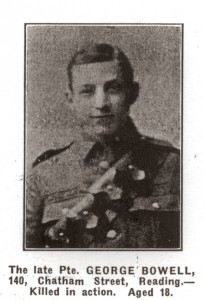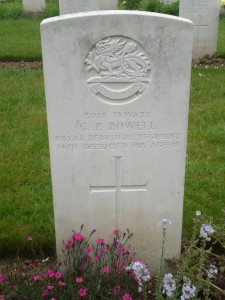George Percy Bowell
Private 3088
1st/4th Royal Berkshire Regiment
Division 34
 |
 |
George Percy Bowell was the youngest son of Mr Richard and Mrs Eliza Bowell, of 140, Chatham Street, Reading.
The Reading Standard 22nd May 1915 published an extract of a letter to his sister which describes his time in action on May 9th 1915.
“Last Sunday, which was Hospital Sunday, we had our baptism of fire. From 4.30 to 7am artillery bombarded the enemy’s trenches, at seven we opened fire and went on firing for an hour. From nine to ten machine guns fired, and in the afternoon howitzers fired till four, when the artillery opened and went on till seven. An enemy shell burst over the trench and wounded one of my section in both knees and tore two sandbags open. So the day passed, and it was very exciting, I can tell you. All the boys are keeping pretty fair.”
The battalion was stationed in Ploegsteert Wood (known to the men as Plugstreet). The excitement about which George Bowell writes and which so enlivened his day was an event to fool the Germans into thinking that reinforcements were arriving. The Battles of Souchez and Festubert began in the south on the 9th May. It was important to keep the Germans interested in the normally quiet sector, rather than to allow them to think that they could thin their line and send men to join the southern battle. For the battalion stationed in Plugstreet half a company of men, were sent marching for several hours, up and down the corduroy tracks in the woods, (these were roads made of wooden planking laid edge to edge,) thus creating extra noise, whilst their rifles were exhibited in the firing trenches.
George Bowell died on 14th December 1915, killed in action whilst on patrol, aged 18. The notification was published in the Reading Standard 25th December 1915. It is quoted in full.
“Educated at Greyfriars School, he was employed by Mr Cook, butcher, Alfred Street. He joined the Territorials in October, 1914, and after being on active service nine months was expected home on leave shortly. He was the youngest, or one of the youngest, members of his platoon, but was a smart, well built young fellow and would have passed for 24. He played for Reading Invicta Football Club and was a good boxer, winning the officers prize even in France. His parents learnt that he fell on night patrol. He was popular with his comrades, as this letter from Sergt. William A. Roberts to his mother shows:
“May I offer you my deepest sympathy in the terrible loss you have sustained? For nine months we had served together, and your boy was always one of the best soldiers, willing, brave, able and popular with all. You will be glad to know that he died almost instantaneously and suffered no pain. We buried him side by side with several others of the Berks.”
George Bowell is commemorated on the family grave headstone in the Reading Cemetery. He is buried at Hébuterne Military Cemetery, France, location I.C.11.
“Canon W. Welchman, the chaplain, who conducted the funeral wrote: “Although a stranger, I feel I must write to say how deeply I sympathise with you in the sad loss which has fallen upon you. He was buried in the presence of many of his friends in a military cemetery. Many will mourn for him.”
A friend, A. Blissett, writes:- “We are all sorry to loose him, for he was liked by everybody, and he died doing his duty, for which he was ever ready. His Battalion Sergeant Major said what a good lad he was – in fact, he could not speak too highly of him. His funeral was accorded full military honours and his mates were present to witness the rites. I have a little memento belonging to George – it’s a pencil case which he brought out with him, and I shall prise it greatly, for it belonged to a good, cheerful, obliging and praiseworthy comrade, When I am in the neighbouring village I shall place flowers on his grave.”
The Battalion were stationed at Hébuterne, having taken over responsibility for that part of the line on July 22nd 1915, after their initial training at Ploegsteert. A major incident occurred in August but the autumn and winter months were relatively quiet. There was the occasional fight with patrols challenged but no casualties were reported until 14th December when a party from “A” company were ambushed in a sunken road and one man, George Bowell, was killed and three injured. The incidents relating to the ambush were reported in a Reading Standard article of 29th January 1916.
“Before leaving France on a weeks leave Private Charles Chomley 1st/4th Royal Berks, was recommended for recognition for gallantry. When Private George Bowell, of the same regiment, was mortally wounded, Private Comley and Lance Corporal N. Clayton were wounded too. Clayton returned to the Berks., lines and fetched more bombs and went again, while Comley stayed with his dying comrade in the midst of great danger. It appears that a party of the 1/4th were on patrol when the enemy opened fire upon them with a machine gun. Comley, a Childrey lad, at the time of his distinguished conduct was only 17 years of age.”